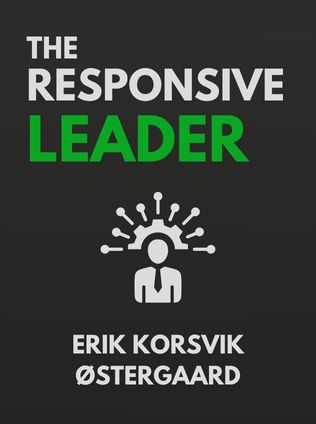
The Responsive Leader
How to Be a Fantastic Leader in a Constantly Changing World
By Erik Korsvik Østergaard
Published 02/2018
About the Author
Erik Korsvik Østergaard is a renowned expert in leadership, digitization, strategy, change management, and organizational transformation. As a partner in Bloch&Østergaard, which he co-founded in 2014, Erik has dedicated over 15 years to exploring and implementing mechanisms for the future of work. His efforts have focused on developing a leadership framework that integrates megatrends, theory, and real-life practices. His extensive experience as a manager, project manager, and consultant has given him a deep understanding of the evolving needs of modern organizations and leaders.
Main Idea
In "The Responsive Leader," Erik Korsvik Østergaard addresses the urgent need for a new type of leadership in a world characterized by volatility, uncertainty, complexity, and ambiguity. The book emphasizes the necessity of a paradigm shift in leadership and organizational practices, focusing on relationships, purpose, value-creation, engagement, networks, transparency, involvement, belonging, and trust. Østergaard provides a comprehensive guide for leaders to adapt to these changes, fostering a culture of innovation, agility, and resilience.
Table of Contents
- Introduction
- The Paradigm Shift
- Principles for the Future
- Purpose and Direction
- Triple-Bottom-Line
- Innovation as Usual
- Innovation—Everybody and Everywhere
- Viscous Culture
- Roles and Behaviors of the Responsive Leader
The Paradigm Shift
The world is undergoing rapid and profound changes driven by technological advancements. These changes demand a shift in leadership mindsets, skillsets, and behaviors. Leaders must move beyond traditional management and embrace a more adaptive, innovative, and people-centric approach. As Østergaard states, "Volatility and change can be met with positive approaches in this tremendous opportunity for shaping the future."
This shift is not merely about adopting new tools or technologies. It involves a fundamental change in how leaders view their roles and responsibilities. The responsive leader must be proactive, anticipating changes and preparing for them rather than reacting after the fact. This requires a mindset open to continuous learning and improvement, always seeking new ways to add value and drive progress within the organization.
The paradigm shift also involves recognizing the importance of emotional intelligence in leadership. In a world where change is constant, leaders must be able to empathize with their teams, understanding their fears and concerns, and providing support and guidance. This human-centered approach is crucial in building trust and fostering a culture of collaboration and innovation.
Principles for the Future
The future of work is centered around people and their relationships. Organizations must adopt a "human to human" (H2H) approach, prioritizing purpose, meaning, and value-creation. Experimentation is crucial in this rapidly changing environment. Leaders should encourage deliberate experimentation, testing, and investigation to navigate the multiple "right" answers to questions.
- Danske Bank's culture project focused on employees and culture first, leading to significant organizational changes and improved engagement.
- Pingala's mentor/mentee structure fosters peer-to-peer development, eliminating the need for traditional management roles.
One of the key principles for the future is agility. In a constantly changing world, organizations must be able to pivot quickly, adapting to new challenges and opportunities. This requires a flexible approach to strategy and planning, where long-term goals are balanced with short-term adaptability. Leaders must foster a culture where experimentation is not only accepted but encouraged, allowing teams to test new ideas and learn from failures without fear of repercussions.
Sign up for FREE and get access to 1,400+ books summaries.
You May Also Like
The Subtle Art of Not Giving a F*ck
A Counterintuitive Approach to Living a Good Life
By Mark MansonRich Dad Poor Dad
What the Rich Teach Their Kids About Money - That the Poor and Middle Class Do Not!
By Robert T. KiyosakiHow To Win Friends and Influence People
The All-Time Classic Manual Of People Skills
By Dale CarnegieQuiet: The Power of Introverts
The Power of Introverts in a World That Can't Stop Talking
By Susan Cain



















